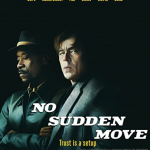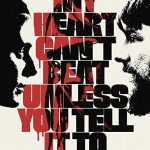A truffle hunter who lives alone in the Oregonian wilderness must return to his past in Portland in search of his beloved foraging pig after she is kidnapped.
Chuck says:
Most actors would look ridiculous lugging around the load of melancholy Nicolas Cage shoulders in Michael Sarnoski’s “Pig.” Yet, the myriad eccentric performances the screen vet has gleefully embraced over the years has prepared us for anything he might attempt. However, this is not one of his purposely broad, over-the-top performances as seen in “Color Out of Space,” “Mandy” and far too many others to mention. No, the surprise here is how staid and insular he is, delivering a finely calibrated performance that keeps the viewer riveted in this deliberately paced examination of grief.
Robin (Cage) has exiled himself to the woods of the Pacific Northwest. Once the premiere chef in Portland’s world of haute cuisine, he’s left all that behind, content to live alone with his truffle hunting pig. Disheveled and unkempt to the nth degree, he’s allowed his environment to consume him, much as he did when pursuing success in the pretentious arena he left behind. His only connection to the outside world is Amir (Alex Wolff), a would-be restauranteur who he sells his truffles to.
All is well until someone steals his pig and Robin is forced to return to the world he’s shunned. As he goes from one four-star restaurant to the next, encountering old rivals, meeting new chefs and reuniting with those he left behind, pieces of his past are exposed until the reason for his leaving is revealed.
While “John Wick” used a similar premise as an excuse for a balletic, hyper-violent thriller, “Pig” is a character study, Robin reluctantly embarking on a journey in which he’s forced to revisit a world that caused him nothing but pain, nearly destroying him. It’s an epic emotional voyage (two of the restaurants in play are named “Eurydice” and “Hestia” after all) that finds our hero having to face his painful past, given the opportunity to heal or stay in emotional exile.
The stops he makes along the way are inspired, with only one misstep occurring. Robin’s having to contend with a subterranean fight club whose combatants are the dregs of Portland’s restaurant scene, while necessary for the character’s catharsis, rings hollow, a bit desperate. Among the highlights, and there are many, is Robin’s face-to-face with the chef at “Eurydice,” a man desperate to please and impress at all costs, a reflection of what Robin once was, his words of warning about what will befall this hollow man falling on deaf ears.
Amir is Robin’s companion on his journey, Wolff wisely choosing not to compete with Cage, complimenting his performance with a solid one of his own. His false bravado masks the pain he feels for having been shunned by his unfeeling father (Adam Arkin), a restauranter himself who also has a deep reservoir of pain, keeping his son at a distance as a result. It’s inevitable that the two older men will meet, the result being the film’s moving, emotional climax.
Sarnoski proves to be a director worth watching, what with his ability to create a grounded narrative and the restraint he displays, believing in the strength of the story and his cast. His less-is-more approach will hold him in good stead. Of course, it’s Cage’s moving, slow burn performance that sears in the memory. He reminds us that when the material demands it what an effective, subtle performer he can be. He brings the humanity of this eccentric to the fore, the final scene a devastating moment of mourning and acceptance that cuts to the core. His turn and Sarnoski’s fine work makes “Pig” a sleeper worth seeking out.
3 1/2 Stars




